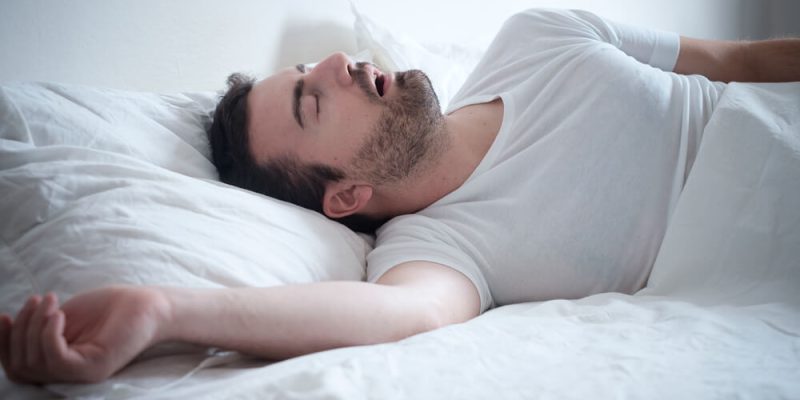Sleeping with your mouth open is often the subject of jokes and laughter. You might even have had a photo taken of you while you were snoozing on the sofa. However, the medical profession doesn’t endorse this procedure. In fact, they often recommend that we try not to allow younger children to adopt the habit.
Mouth breathing at night has a great impact on your health. For instance, sleep apnea is often due to this process. Indeed, sleeping with your mouth open often leads to snoring and failures in breathing and oxygen supply to the brain. It also often translates into exhaustion, headaches, and more serious alterations of sleep apnea.
Far from merely being anecdotal and the subject of ironic comments between you and your partner, friends, or family, breathing through your mouth at night is something that you must pay attention to. You should think of the well-known advice, “Breathe better to live better”. Let’s take a closer look.
Sleeping with your mouth open can have serious effects on your oral and respiratory health.
Beware of sleeping with your mouth open
You might’ve heard of the medical treatise of the Regimen sanitatis Salernitanum. It was a poem written by the Schola Medica Salernitana in the twelfth and thirteenth centuries. In this ancient work, they warned of the drawbacks of sleeping with your mouth open. They claimed it wasn’t healthy and better avoided.
In reality, when you fall asleep you’re unaware that you might open your mouth. However, you certainly realize that when you wake up, you still feel tired. This is what the journalist James Nestor noticed when he underwent an experiment.
Scientists at Stanford University covered his nostrils with silicone and surgical tape to test the effects of mouth breathing for ten days. This experience and research prompted him to write his book, Breathe: The New Science of a Forgotten Art (2021). In it, he reveals the causes and effects of nocturnal mouth breathing.
Breathing should always be through the nose, never through the mouth. If you spend months or years breathing through your mouth at night, you can develop various health problems.
Increased risk of tooth decay
There are warnings from oral health experts and studies, such as one conducted by the University of Oregon (USA) that confirm an increased risk of tooth decay. They claim that sleeping with our mouths open alters our pH, and the accumulation of germs rises. Consequently, we tend to suffer more cavities, as well as halitosis.
Pharyngitis, an annoying itchy throat
Have you ever woken up with a dry throat? This is usually a clear sign that you’ve spent several hours breathing through your mouth and not your nose. It’s the latter that has the task of heating the air you breathe and moistening it to take it to your lungs.
If you breathe through your mouth, your throat has to moisten the oxygen and this ends up drying out the mucosa, often leading to chronic pharyngitis.
Your lungs aren’t properly ventilated
As you now know, the healthiest breathing is the one you carry out through your nose, never through your mouth. In fact, if you spend between seven and ten hours sleeping, it’s essential that you don’t breathe through your mouth. On the other hand, when you breathe through your nose, the inhaled air is filled with nitric oxide, which favors gas exchange for correct pulmonary ventilation. This process allows you to purge viruses and bacteria from your body.
In light of the above, we can say without a doubt that breathing through your mouth for years has a serious effect on your health. That’s because it means your lungs aren’t properly ventilated.
Nocturnal mouth breathing sustained for years can lead to pulmonary hypertension.
Sleeping with your mouth open causes you to snore and can lead to sleep apnea
When sleeping with your mouth open, your tongue sinks back, obstructing your airway. Obviously, this means less oxygen supply for your body. As if this weren’t enough, you also snore. Snoring isn’t only annoying, but also has a negative effect on your health.
When you don’t breathe well, air pressure collapses your pharynx and you snore. Snoring can often lead to dangerous sleep apnea. In fact, research conducted by the University of British Columbia (Canada) claimed that there’s a really significant relationship between people who sleep with their mouths open and obstructive sleep apnea. Furthermore, if it’s not treated, it can lead to chronic fatigue, risk of suffering from depressive disorders, coronary heart disease, and stroke.

How to avoid mouth breathing at night
Breathing through the mouth isn’t healthy. If you’ve been adopting this involuntary gesture at night for a long time, consult your doctor. It’s important to rule out any possible respiratory problems and, of course, the presence of sleep apnea.
There are simple strategies you can adopt to avoid sleeping with your mouth open. They’re as follows:
- Nasal saline irrigation.
- Nasal strips that open the nose and dilators.
- Some people ‘train’ their jaws to close at night. To do this, you should put a small piece of hypoallergenic tape in the middle of your lips at night. The moment you open your mouth, you’ll notice it and will gradually correct yourself.
- Try taping a tennis ball to the back of your sleepwear. It’ll prevent you from sleeping on your back and, consequently, from snoring.
Finally, the most appropriate thing is to consult with experts in sleep hygiene. After all, there’s nothing as important as breathing well, and if it’s through the nose, then it’s so much better.
The post Why Shouldn’t You Sleep With Your Mouth Open? appeared first on Exploring your mind.



















Comments